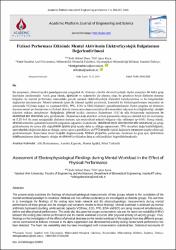| dc.contributor.author | Göksel Duru, Dilek | |
| dc.contributor.author | Işıkçı Koca, Elif | |
| dc.date.accessioned | 2021-03-11T07:43:00Z | |
| dc.date.available | 2021-03-11T07:43:00Z | |
| dc.date.issued | 2019 | en_US |
| dc.identifier.citation | Göksel Duru, D., & Işıkçı Koca, E. (2019). Fiziksel Performans Etkisinde Mental Aktivitenin Elektrofizyolojik Bulgularının Değerlendirilmesi. Akademik Platform Mühendislik ve Fen Bilimleri Dergisi, 7(3), 389-397. | en_US |
| dc.identifier.issn | 2147-4575 | |
| dc.identifier.uri | 2147-4575 | |
| dc.identifier.uri | https://hdl.handle.net/20.500.12846/546 | |
| dc.description.abstract | Bu çalışmada, zihinsel işyükü paradigmasının yorgunluk ile ilintisine yönelik elektrofizyolojik ölçüm sonuçları iki farklı grup üzerinden incelenmiştir. Ayrık grup olarak, sporcular ve sedanterler ele alınmış olup, bu grupların beyin dinlenim durumu bulguları ile mental performans esnasındaki gerçek zamanlı elektrofizyolojik ölçümleri karşılaştırılmış ve bu bulgulardaki değişimler incelenmiştir. Mental aritmetik işlem ile zihinsel işyükü yaratılarak, kontrollü bir fiziksel performans öncesinde ve sonrasında VO2max değeri ve eşzamanlı EEG, PPG, EDA ve EKG ölçümleri gerçekleştirilmiştir. Farklı gruplara ait dinlenim durumu mental performansları ve fiziksel aktivite sonrasında oluşan mental işyükü arasındaki kalp atım hızı değişkenliği, oksijen tüketimi miktarı tartışılmıştır. Bulgularda, zihinsel işyükü süresince ölçümlenen EEG’de alfa frekansında baskılanma ile elektriksel deri direncinde artış görülmüştür. Ölçümlenen kalp atım hızı verileri parametrik olmayan istatistik test ile incelenmiş ve 0.15–0.4 Hz arası aralığındaki dinlenim durumu için istatistiksel anlamlı bulgular elde edilmiştir (p<0.05). Sonuç olarak, zihinsel aritmetik işyükünün kontrollü yorgunluk sağlanmış ölçümlerde, elektriksel beyin aktivitesinde alfa tutulumuna yol açtığı gözlemlenmiş ve ayrıca alfa değişiminin sporcu grup içinde daha az olduğu saptanmıştır. PPG sinyalleri değerlendirildiğinde, sporculardaki değişimin daha az olduğu, ayrıca sporcu gönüllülere ait PPG sinyallerindeki değişimin varyasyon sergileyebileceği gözlemlenmiştir. Raporlanan öncül bulgular doğrultusunda, fiziksel yorgunluk şartlarında incelenen iki grup için, sporcuların odaklanmalarının daha başarılı olduğu ve zihinsel işyükünden daha az etkilendikleri öngörülebilmektedir. | en_US |
| dc.description.abstract | The present study examines the findings of electrophysiological measurements of two groups related to the correlation of the mental workload paradigm to tiredness. Athletes and non-athletes (sedentary) are investigated as discrete groups. The aim here is to investigate the findings of the resting state brain network and the electrophysiologic measurements during mental performance of these groups and the changes and variations related to these findings. Mental workload is achieved via mental arithmetic backward counting, while aerobic capacity VO2max, EEG, PPG, EDA and ECG are being measured simultaneously, before and after physical performance. The study also discusses the oxygen consumption rate and the heart rate variability (HRV) between the resting state mental performance and the mental workload occurred after physical activity of varying groups. Thus, findings on the investigation of the effects of physical tiredness on the mental workload of the subjects from two different groups, can be summarized as follows: Increase in the alpha suppression and electrodermal activity during mental work performance has been detected. The heart rate variability data has been investigated with nonparametric statistical test. Statistical test results of resting state for eye closed paradigm for frequency range of 0.15–0.4 Hz are determined as statistically significant (p<0.05). Alpha frequency suppression is detected as a result for brain electrical activity analysis which are in agreement with literature. The EEG alpha activity detected while mental performance reflects more suppression than the eyes closed resting state alpha activity. To conclude, EEG alpha suppression is caused by mental arithmetic workload in volunteers with controlled physical performance, and the alpha suppression within sportsmen group is less, where the suppression of alpha activity obtained in sportsmen EEG is more explicit than in sedentary. Assessing the PPG signals results less variation in sportsmen. Results specify that PPG signals of sportsmen group represent less variances than PPG data of sedentary group. Also another finding specifies, that PPG signals within group may vary like in sportsmen group. According to these preliminary results, it can be predicted that the athlete group is less affected by mental workload despite being more focused and physically tired. | en_US |
| dc.language.iso | tur | en_US |
| dc.publisher | Academic Platform | en_US |
| dc.relation.isversionof | doi.org/10.21541/apjes.520952 | en_US |
| dc.rights | info:eu-repo/semantics/openAccess | en_US |
| dc.subject | Alfa Baskılanması | en_US |
| dc.subject | Aerobik Kapasite | en_US |
| dc.subject | Mental İşyükü | en_US |
| dc.subject | Nöral Yetkinlik | en_US |
| dc.subject | Alpha Suppression | en_US |
| dc.subject | Aerobic Capacit | en_US |
| dc.subject | Mental Workload | en_US |
| dc.subject | Neural Competence | en_US |
| dc.subject | Alpha-Unterdrückung | en_US |
| dc.subject | Aerobe Kapazität | en_US |
| dc.subject | Geistige Arbeitsbelastung | en_US |
| dc.subject | Neuronale Kompetenz | en_US |
| dc.title | Fiziksel performans etkisinde mental aktivitenin elektrofizyolojik bulgularının değerlendirilmesi | en_US |
| dc.type | article | en_US |
| dc.relation.journal | Academic Platform Journal of Engineering and Science | en_US |
| dc.contributor.authorID | 0000-0003-1484-8603 | en_US |
| dc.identifier.volume | 7 | en_US |
| dc.identifier.issue | 3 | en_US |
| dc.relation.publicationcategory | Makale - Uluslararası Hakemli Dergi - Kurum Öğretim Elemanı | en_US |
| dc.contributor.department | TAÜ, Fen Fakültesi, Moleküler Biyoteknoloji Bölümü | en_US |
| dc.contributor.institutionauthor | Göksel Duru, Dilek | |
| dc.identifier.startpage | 389 | en_US |
| dc.identifier.endpage | 397 | en_US |

















